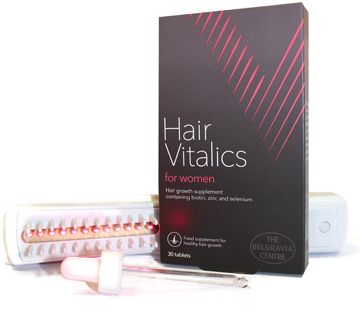The Potential of IVF to Cause Hair Loss
IVF (in vitro fertilisation) in itself, that is, the process whereby a human egg is fertilised by sperm outside of the female body and then inserted into the woman's womb with the intention of starting a successful pregnancy, will probably not in itself cause hair loss.
That said, there are various direct and indirect factors related to IVF that could potentially cause certain types of women's hair loss. In this blog post we will explore what different hair loss symptoms could indicate, however it's recommended that women visit their doctor in order to undergo blood tests to cancel out other potential causes of hair loss (such as iron deficiency) before visiting a hair loss specialist.
Haywire Hormones
The first potential cause of hair loss in women undergoing IVF has to do with the hormone manipulation that is part of the IVF process. Because the hair system is extremely sensitive to changes that occur elsewhere in the body, hormonal flux can result in the condition diffuse thinning, where hair appears thinner all over the scalp but there are no 'bald spots'.
When diffuse thinning takes place, the first usual step is to locate and deal with the underlying issue. However, it is possible to treat the thinning whilst this process is happening, and if the diffuse thinning is likely to be due to IVF, it's not always as simple as just stopping the treatment. For women, there is one proven hair loss medication available, which is called minoxidil.
Minoxidil is a topical treatment that has been licensed by the MHRA and approved by the FDA as a women's hair loss medication. A hair loss specialist would be able to suggest the ideal daily dosage for your specific case once a diagnosis has been made.
 When Treatment is Required
When Treatment is Required
Diffuse thinning is not the only type of hair loss that can potentially occur on account of factors related to IVF. The autoimmune disease alopecia areata can appear in the form of patchy hair loss all over the scalp. There can be many precipitating factors for alopecia areata, and hormonal changes and pregnancy are just two of these.
Whether or not alopecia areata can be treated depends on how severe your individual case is. If the hair loss is not particularly widespread, it's possible that recommended formulations of high strength minoxidil can help to promote regrowth. Belgravia has had significant success with using this approach to treat clients, as can be seen in the examples featured in our Alopecia Areata Treatment Success Stories gallery. However, alopecia areata cannot be 'cured' as such, and may return again in the future.
It's also possible that the genetic condition female pattern hair loss has been triggered due to the hormonal change and also the potential stress that surrounds IVF treatment. Genetic hair loss appears as a thinning atop the scalp, and requires treatment to stop the condition from progressing and becoming more noticeable. It's also possible that the initial hair loss directly connected to IVF masked the onset of female pattern hair loss, meaning that the timing was coincidental. If you're noticing thinning over six months after you stopped using IVF, this may be the case.
A combination of blood tests and a consultation with a hairloss specialist should be enough to establish the cause of the loss and also whether your type of hair loss can be treated medically, and if so whether this treatment needs to be maintained. A Belgravia hair loss treatment programme complete with regular check-ups and hair growth boosters will ensure that progress is monitored and that the treatment is appropriate.

The Belgravia Centre
The Belgravia Centre is a world-renowned group of a hair loss clinic in Central London, UK. If you are worried about hair loss you can arrange a free consultation with a hair loss expert or complete our Online Consultation from anywhere in the world for home-use treatment.
View our Hair Loss Success Stories, which includes the world's largest gallery of hair growth photos and demonstrates the level of success that so many of Belgravia's patients achieve.
